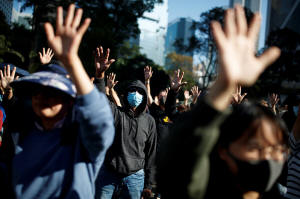Hong Kong court bans protest anthem, saying it can be used as a weapon
 Send a link to a friend
Send a link to a friend
 [May 08, 2024]
By Jessie Pang [May 08, 2024]
By Jessie Pang
HONG KONG (Reuters) -Hong Kong's Court of Appeal on Wednesday granted an
application by the government to ban a protest anthem called "Glory to
Hong Kong", overturning a lower court judgment that had rejected such a
ban because of its possible "chilling effects" on free speech.
The ruling comes amid what critics say is an erosion in Hong Kong's rule
of law and individual rights amid a sweeping national security crackdown
by Beijing that has jailed scores of opposition democrats and shut down
liberal media outlets.
The case has implications for internet freedoms and the operations of
firms including internet platform operators (IPOs) and technology firms
such as Google.
Court of Appeal judges Jeremy Poon, Carlye Chu and Anthea Pang wrote
that the composer of the protest song had intended it to be used as a
weapon.
"In the hands of those with the intention to incite secession and
sedition, the song can be deployed to arouse anti-establishment
sentiments," the judges wrote.
The judges added that "an injunction is necessary to persuade the IPOs
to remove the problematic videos in connection with the song" from their
platforms.

"Although the IPOs have not taken part in these proceedings, they have
indicated that they are ready to accede to the Government’s request if
there is a court order."
Chinese Foreign Ministry spokesman Lin Jian said during a regular press
briefing that "preventing anyone from using or disseminating the
relevant song... is a legitimate and necessary measure by (Hong Kong) to
fulfil its responsibility of safeguarding national security”.
Freewheeling Hong Kong returned from British to Chinese rule in 1997,
with the guarantee its freedoms would be preserved under a "one country,
two systems" formula.
Hong Kong does not have its own anthem. "Glory to Hong Kong" was written
in 2019 amid mass pro-democracy protests that year and was considered an
unofficial national anthem, rather than China's "March of the
Volunteers".
[to top of second column]
|

People raise their hands as they sing the protest anthem "Glory to
Hong Kong" during an anti-government protest in the Central district
of Hong Kong, China, November 30, 2019. REUTERS/Thomas Peter/File
Photo

The court ruling targets those who broadcast or distribute the song
with the intention of inciting others to commit secession, or those
who suggest Hong Kong is an independent state, or who insult the
national anthem.
Exceptions would only be granted to lawful academic and journalistic
activities, the judges added.
The Hong Kong government sought an appeal after High Court Judge
Anthony Chan refused to ban the protest anthem last July, saying
that it could undermine freedom of expression and cause potential
"chilling effects".
The government applied for the injunction last June, after it was
mistakenly played at several international events as the official
anthem, including a Rugby Sevens game and an ice hockey competition.
Google gave no immediate response to a request for comment. It had
earlier said it wouldn't change its search results to display
China's national anthem rather than the protest song when users
search for Hong Kong's national anthem.
DGX Music, the music group behind the song, did not immediately
respond to a Reuters request to comment.
The song was banned in Hong Kong schools after China imposed a
national security law in 2020. In March, authorities enacted another
set of national security laws that some foreign governments say
further undermine rights and free speech.
Beijing rejects the accusation and says the security laws have
brought stability.
(Reporting by Jessie Pang; Editing by James Pomfret, Michael Perry
and Nick Macfie)
[© 2024 Thomson Reuters. All rights reserved.]This material
may not be published, broadcast, rewritten or redistributed.
Thompson Reuters is solely responsible for this content. |